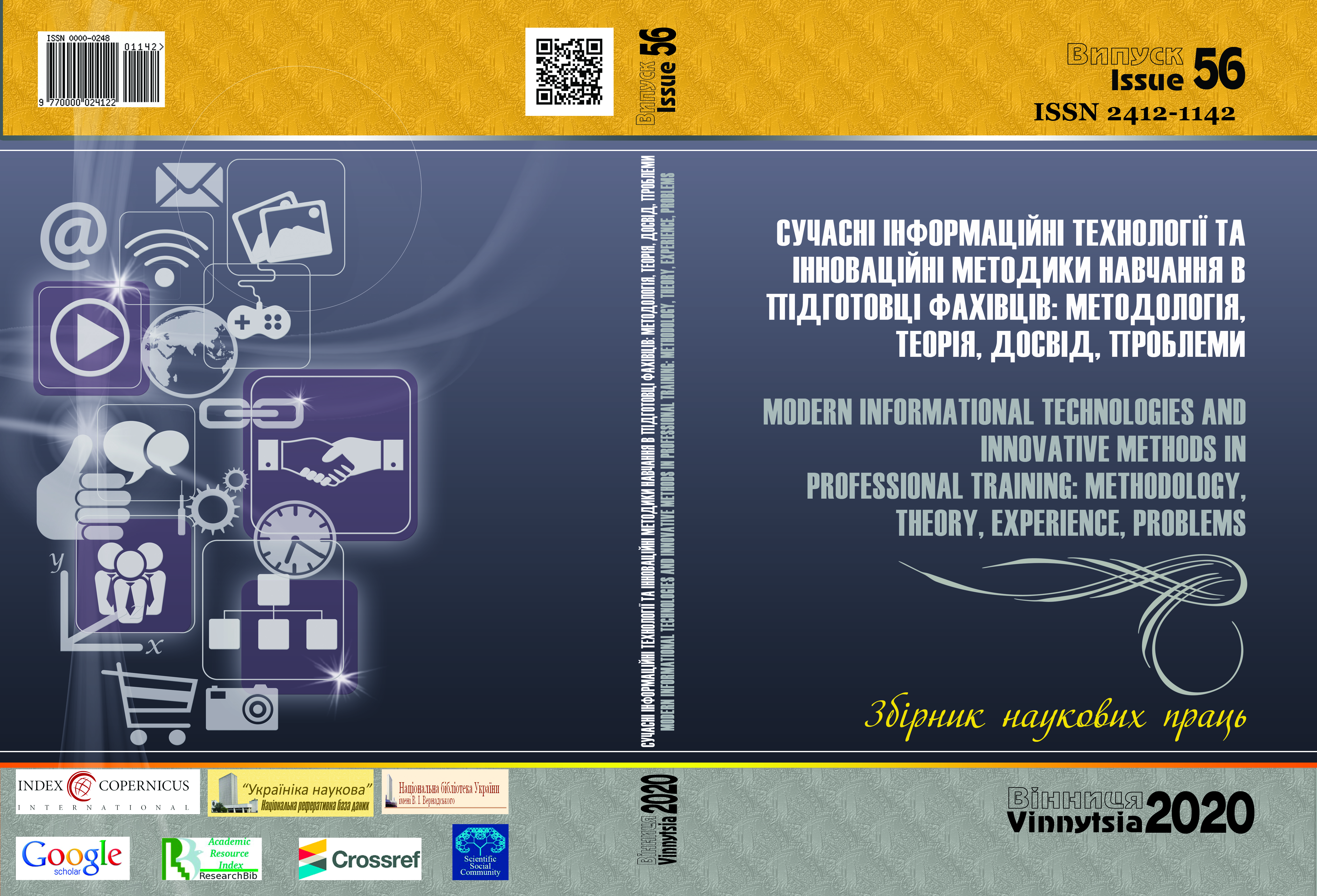INFORMATION COMPETENCE AS A STRUCTURAL COMPONENT OF ANDRAGOGUE PROFESSIONALIZATION
DOI:
https://doi.org/10.31652/2412-1142-2020-56-185-191Keywords:
інформаційна компетентність; андрагог; корпоративний навчальний центрAbstract
The author identified and analyzed structural components of the information competence of the andragogue at the corporate training center, including cognitive and semantic, operational activity, value-
based and motivational, reflexive and evaluative ones. The cognitive and semantic component requires adequate knowledge, i.e. information literacy, which is usually understood as mastering information
technology and its competent use to solve certain typical professional tasks. It deals with the processes of
information processing on the basis of microcognitive acts, namely, analysis, formalization, comparison,
generalization, and synthesis with existing knowledge. The operational activity component is the ability of
the andragogue to actively use professionally oriented information technology in their practice and related
fields in order to develop systematic professional thinking. The value-based and motivational component
involves the entry of the andragogue into the world of corporate values, expanding the range of personal
and professional contacts, the formation of the humanistic value of information culture. The reflective and
evaluation component enables the andragogue to be critical of the flow of information, control their
information activities, analyze the results, and assess both the process and the compliance of the chosen
tools and methods with the goals and norms adopted in the corporate environment.
The author defined the information competence of the andragogue at the corporate training center as an
integrative and functional personal quality that is based on a dynamic combination of knowledge
(information literacy), skills and abilities (information activity) as well as values (information culture) that
enables the individual to use the gained experience to effectively solve socially significant professional and
everyday tasks.
Downloads
References
Баніт О. В. Професійне навчання персоналу в умовах корпоративних навчальних центрів.
Концептуальні засади розвитку освіти дорослих: світовий досвід, українські реалії і перспективи: збірник
наукових статей. 2018. С. 508-515.
Лу’янова Л. Б. Підготовка педагогічного персоналу для роботи з дорослими: теоретичний і методичний
аспекти: монографія. Київ: ІПООД НАПН України. 2016.
Наказ Міністерства економічного розвитку «Про затвердження Зміни No 8 до національного
класифікатора ДК 003:2010» від 15.02.2019 р. No 259. URL: https://www.msp.gov.ua/
files/norm_baza/zminy_8.pdf (04.09.2020).
Орлова Н. С., Мохова, Ю. Л. Впровадження інформаційних технологій в систему корпоративного
управління. Відкрите освітнє е-середовище сучасного університету. 2017. No 3. С. 355-365.
Когут І. Інформаційна компетентність як структурний компонент професійно-педагогічної
комунікативної компетентності педагога в сучасному освітньому просторі. Освітологічний дискурс.
No 3-4 (22-23). С. 246-258.
Лантух Н. И. Педагогические условия формирования информационной культуры у старшеклассников в
системе «лицей-вуз»: Автореф. дис. ... канд. пед. наук: 13.00.01. Северо-Кавказский государственный
технический университет. Ставрополь, 2006.
Філіппова Л. Л. Компоненти, функції та складові інформаційної культури майбутніх економістів.
Сучасні інформаційні технології та інноваційні методики навчання в підготовці фахівців: методологія,
теорія, досвід, проблеми. 2008. No 18. С. 491-495.
Казаков И. С. Формирование готовности к саморазвитию информационной культуры у студентов
педагогического вуза. Автореф. дис. ... канд. пед. наук. Сочинский государственный ун-т туризма и
курортного дела. Сочи, 2006.
Баловсяк Н. Інформаційна компетентність фахівця. Педагогіка і психологія професійної освіти. 2004.
No 5. С. 21-28.
Рассказов Ф. Д., Митющенко Е. В. Сущность, содержание и компоненты информационной компетенции
студента педагогического направления. Современные проблемы науки и образования. 2017. No 5.
URL: http://www.science-education.ru/ru/article/view?id=27003 (05.09.2020).
Downloads
Published
Issue
Section
License
Copyright (c) 2021 Ольга Баніт

This work is licensed under a Creative Commons Attribution 4.0 International License.

